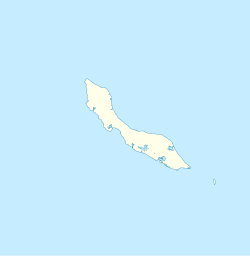 Big mama statue by Hortence Brouwn in front of the museum | |
| Established | April 1999 |
|---|---|
| Location | Klipstraat 9, Otrobanda, Willemstad, Curaçao |
| Coordinates | 12°06′29″N 68°56′08″W / 12.10801°N 68.93562°W |
| Website | kurahulanda.com |
Kurá Hulanda Museum is an anthropological museum located in the Kura Hulanda Village district of Willemstad, Curaçao. The museum teaches about the Atlantic slave trade, and African history in the Caribbean, and was opened in April 1999 by Jacob Gelt Dekker.[1]
History
[edit]The Kurá Hulanda Museum was an initiative of Dutch entrepreneur Jacob Gelt Dekker. In the late 1990s, he was approached by the Government of Curaçao to develop the western quayside in Otrobanda where historically the slave ships arrived with slaves to be sold at the nearby slave market. Dekker decided to buy the derelict buildings on the quay and market, restore the buildings to their original condition, and open a museum at the site specialising in the Atlantic slave trade and African history in the Caribbean.[2][3]
The museum opened in April 1999.[4] It consists of 15 buildings, covering an area of 16,000²ft[4] displaying the history from the capture in Africa to the relocation in the Americas. It also displays the cultural heritage of the slaves on the culture of Curaçao in particular and the Caribbean in general.[5]
Hotel
[edit]Dekker bought most of the buildings on the hillside,[2] and opened the luxury Kurá Hulanda Hotel & Lodge next to the museum. The hotel was declared bankrupt in October 2013.[6] In 2019, the hotel was purchased by BMG management, and they took over the hotel in 2021. The hotel was closed for a year fir refurbishment, although the museum remained operational during that time. Sadly Dekker died in 2019 before the sale was completed. [7]
References
[edit]- ^ "Kura Hulanda Museum". Curacao.com. Retrieved 19 June 2025.
- ^ a b Adrian Mourby (23 October 2011). "Freedom at last, after centuries of Dutch rule". The Independent. Retrieved 19 April 2021.
- ^ "About Us". Kura Hulanda Village. Retrieved 19 June 2025.
- ^ a b "Museum". Kura Hulanda. Archived from the original on 2 April 2015. Retrieved 19 April 2021.
- ^ "Kura Hulanda Museum". Curacao.com. Retrieved 19 April 2021.
- ^ "Kurá Hulanda Curaçao failliet". Curacao 365 (in Dutch). Retrieved 19 April 2021.
- ^ "Kura Hulanda". CaribJournal. Retrieved 19 June 2025.
External links
[edit]- Official site
 Media related to Kura Hulanda museum at Wikimedia Commons
Media related to Kura Hulanda museum at Wikimedia Commons


 Français
Français Italiano
Italiano



